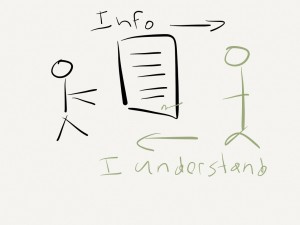Background
Although it is more than 60 years later, most people have never heard of Henrietta Lacks – whose cells have been used to save the lives of countless people. 31 year-old Henrietta was an African American woman living in the early-mid 1900’s. After being diagnosed with cervical cancer, Henrietta died in 1951 at Johns Hopkins Hospital. Due to the fact that research on such patient’s was very limited at the time, a biopsy of her tumor was taken for research purposes without ever asking her permission (Thomas, 254). What happened next changed the lives of many people – the cells reproduced and never stopped reproducing, essentially becoming “the first immortal cells ever grown in a laboratory” (Thomas, 254). These cells became famous not only in the medical field but also worldwide after being mass-produced. It is here we begin to see how the principles of ethics are being violated.
Dilemma
Within this case, the main dilemma that stands out to me revolves around the violation of Henrietta and her family’s autonomy. Henrietta and her family not only suffered considerable amounts of injustices during this time but continue to suffer through today’s time. It is noted that although Henrietta’s cells were taken without informed consent when she died in 1951, it wasn’t until 1971 that her family first became aware of the fact that her cells existed (Ethics of Informed Consent).
There were several opportunities before/during treatment that Henrietta was competent enough for physicians to ask for her consent in regards to taking her cells. What boggles me even more is the fact that her family members were also present and willing to speak their minds throughout this entire process. This is where we see the complete disregard of the ethical principle of autonomy. From an opposing viewpoint, one may argue that Henrietta’s status in society (an uneducated black woman) made it very difficult for physicians to communicate to her the details of her care. However, I would argue that a simple explanation and inquiry as to her feelings in regards to such a situation would have benefited all parties involved.
Additionally, one may present the argument that the physicians measured the principles of beneficence and non-maleficence and came to the conclusion that helping Henrietta and attempting not to harm her outweighed her autonomous rights. Although it is unclear in the reading, the physicians acquired the cells as leftovers done from a surgery intended to help Henrietta (scienceblogs). While the doctors felt as though their actions were benefiting Henrietta and the researchers felt as though they were benefiting the good of a greater number of people (mankind), it is evident that Lacks’ family did not share such sentiments. Although the outcomes proved to provide good to the greater number of people, something that falls along the lines of utilitarianism, I truly believe that the physicians failed to assess the situation properly.
Reflection
In this case, the dilemma revolves around the basic ethical principle of autonomy and its disregard. Considering Henrietta’s situation, I believe that paternalism played a role in the disregard of autonomy – as a black woman in the 1950’s Henrietta did not have the option to question her doctor’s choices even is she was presented with such an opportunity. Such a situation could be termed “benevolent deception” meaning that the physicians believe they were doing Henrietta a favor in not taking the time to explicitly state what was wrong with her and the extent of her diagnoses. I’m not saying that if such a case was presented today that the patient would 100% agree with the physicians or 100% disagree with the physicians, but at least the patient would be given the choice. While some may put more emphasis on the effects that Henrietta’s cell have had, I would put the emphasis on the lack of information and choices presented to Henrietta.
Works Cited
Ethics of Informed Consent . N.p., n.d. Web. 8 Apr. 2015. <http://rabinmartin.com/insight/ethics-of-informed-consent-and-the-legacy-of-henrietta-lacks/>.
N.p., n.d. Web. 10 Apr. 2015. <https://hawaiiesquire.files.wordpress.com/2012/05/informed-consent-consideration.jpg>.
Thomas, John and Wilfrid Waluchow. Well and Good: A Case Study Approach to Biomedical Ethics. 3rd ed. Broadview Press Ltd., n.d. Print.

It is true that the cells benefitted a lot of people, but I agree with your emphasis on the harm against Henrietta Lacks and her family. You emphasize autonomy, but the principles of non-maleficence, beneficence, and justice were all violated against Lacks and her family in this case: no consent was given to use the cells, the family has been subjected to “unwanted intrusion and attention,” and they have not received monetary compensation (Thomas 254-5). It was standard practice for samples to be taken from the patients of the free hospital that Lacks was treated in (254), and the scientists probably did not consider how their research could harm the patients. This fact makes me sympathize with the scientists at that time a little bit, but Hela cells were being used decades after her death. While it might have been (wrongly) considered okay for the cells to be used without her permission or monetary benefits to her family back then, certainly actions like those of these researchers would not be permissible today. Sure, consent should have been obtained/compensation should have been made at the time the cells were taken, but what bothers me even more is that even with the progress in ethics made over the past few decades, the family has still not received due recognition and payment.
Thomas, John E., Wilfrid J. Waluchow, Elisabeth Gedge. Well and Good. a Case Study Approach to Health Care Ethics. 4th ed. Peterborough, Ontario: Broadview, 2014. 254-255. Print.